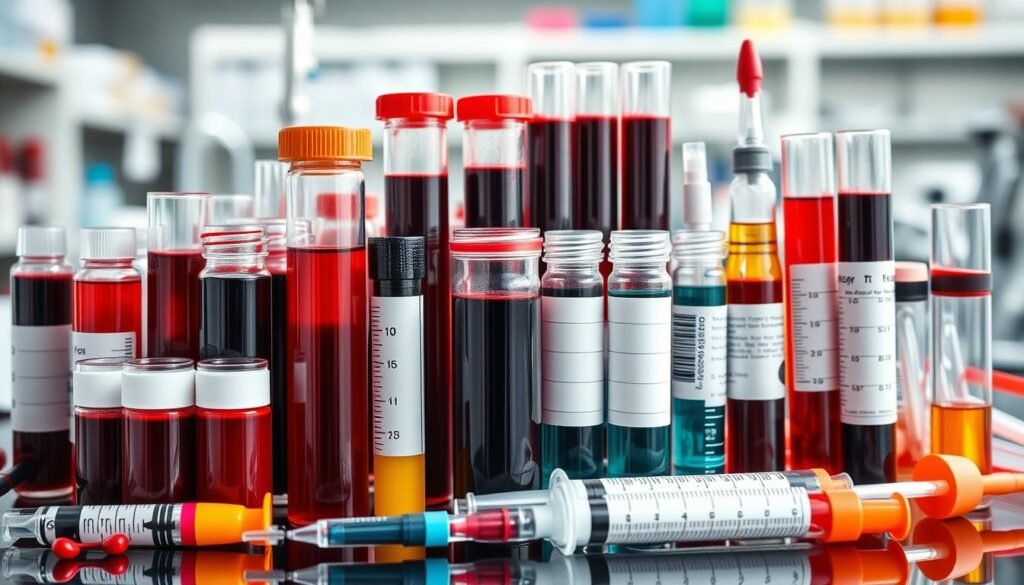About 2.5 million people in the U.S. are thought to have chronic fatigue syndrome. This fact shows why we need good health checks and right diagnoses of fatigue. A comprehensive fatigue blood test is key for finding out why someone feels so tired. It looks for health issues like anemia, vitamin shortages, or thyroid problems.
Getting this test helps people understand their health better. It’s also a big step in improving how they feel every day. Since fatigue can really change how we live, knowing why it happens is important. This way, we can treat it the right way.
Key Takeaways
- The comprehensive fatigue blood test is designed to uncover health issues related to persistent fatigue.
- It helps identify conditions such as anemia, vitamin deficiencies, and thyroid dysfunction.
- Understanding the testing process is essential for managing fatigue effectively.
- Early diagnosis can lead to better treatment options and improved quality of life.
- To learn more about fatigue diagnostic codes, refer to this link.
- Fatigue not only affects physical health but can also impact emotional and mental well-being.
Understanding Fatigue: Why It Matters
Fatigue is more than just feeling tired. It’s a signal that something might be off with your health. There are many reasons why people feel fatigued. Some are easy to handle, but others need a doctor’s care. Knowing the causes can help improve your health.
Common Causes of Fatigue
Many things can make you feel very tired. Some common reasons for fatigue are:
- Anaemia: This condition happens when you don’t have enough red blood cells or haemoglobin. It often causes fatigue.
- Thyroid Disorders: These disorders make your thyroid produce less hormone, leading to tiredness. Checking your thyroid levels can show if there’s a problem.
- Vitamin Deficiencies: People low in vitamin D often feel fatigued.
- Hormonal Imbalances: Cortisol is an important hormone. If it’s out of balance, you might feel more tired. Saliva cortisol testing can check this.
- Chronic Fatigue Syndrome: This affects many Americans. It causes severe fatigue, problems sleeping, and trouble with daily activities.
- Gut Health: Problems like ‘leaky gut’ can be connected to chronic fatigue syndrome.
- Stress: Long-term stress can change your hormones and make you feel more tired.
Recognizing When to Seek Medical Help
If fatigue doesn’t go away with rest, it’s important to see a doctor. Getting help early can identify serious issues and improve how you manage symptoms. If you have ongoing problems with sleep or feeling energized, it could mean something more serious is happening. Doctors can run tests to figure out what’s wrong, including for chronic fatigue syndrome. For details on diagnosing it, check out this resource.
What Is a Comprehensive Fatigue Blood Test?
A comprehensive fatigue blood test looks for health problems causing constant tiredness. It tests various blood parts crucial for energy. The purpose of testing is to find markers of diseases like anemia or thyroid issues, affecting energy. This approach helps doctors understand a patient’s health better and create effective treatment plans.
Definition and Purpose
This blood test checks for many causes of severe fatigue. It includes a Complete Blood Count (CBC) to check iron levels and tests for thyroid hormone production. The comprehensive fatigue blood test is crucial for finding vitamin shortages and metabolic issues. It guides doctors in making decisions to improve energy levels.
How It Differs from Other Tests
This test is unique because it specifically looks for fatigue causes. It goes beyond general health checks to pinpoint specific issues. It’s for certain genders and ages, ensuring accurate tests for those in need. This careful selection highlights the importance of understanding each patient’s health story. The comprehensive fatigue blood test is a key first step in treating fatigue correctly.
Preparing for Your Fatigue Blood Test
Getting ready is key to a good fatigue blood test result. You will learn what the test is about and how to prepare. Getting ready properly helps get the best results.
What to Expect Before the Test
Your doctor will explain what you need to do before the test. This talk will cover the need to fast to make the test work better. Depending on the test, such as for glucose or lipids, there will be specific instructions.
Necessary Preparations and Fasting Guidelines
Following fasting rules is very important for a fatigue blood test. Most times, you’ll have to fast for 12 hours and only drink water. Also, stop taking biotin supplements at least 72 hours before. This ensures your results are accurate. Always check with your doctor on how to best prepare.

| Test Preparation Steps | Description |
|---|---|
| Fasting Duration | At least 12 hours before sample collection |
| Water Consumption | Allowed before the test |
| Biotin Supplements | Stop at least 72 hours prior |
| Consult Healthcare Provider | Verify specific preparations for the test |
Fatigue Blood Test: What to Expect During the Process
The blood test process for fatigue is made easy and stress-free. Patients usually find the blood draw quick and efficient. This helps reduce worries about pain or nervousness. The healthcare provider will draw blood from your arm. The whole procedure takes just a few minutes.
The Blood Draw Experience
During the blood draw, your comfort and safety come first. A healthcare professional cleans the area with an antiseptic wipe. Then, they insert the needle to collect the blood into tubes for testing. Most people feel little discomfort during this part.
After taking the blood, a small bandage is often put on the spot. This is to help it heal properly.
Common Testing Techniques Used
There are different fatigue testing techniques, depending on the tests your provider orders. Some common methods include:
- Venipuncture: This is the most usual way, where blood is taken directly from a vein.
- Capillary Sampling: A simpler method often used for smaller blood amounts, usually from a fingertip prick.
These methods are chosen based on what analyses are needed. Some tests might require just a small sample, others need more. The goal of these testing methods is to get accurate results while keeping you comfortable during the blood draw.

Key Components of the Fatigue Blood Test
The fatigue blood test gives deep insights into health issues that may cause fatigue. It includes vital parts that reveal conditions behind fatigue. Each part checks for specific health signs, providing useful info about your health.
Anemia Testing and Its Importance
Anemia testing is key in the fatigue blood test. It looks at hemoglobin and red blood cell count, showing blood health. Low levels could mean blood issues, needing more checks. It’s crucial for finding out why someone feels tired.
Vitamin Deficiency Screening
This screening finds if you lack important vitamins like B12 and D, crucial for energy. Not having enough leads to fatigue and weakness. It helps health experts plan ways to fix vitamin levels and boost energy.
Thyroid Function Tests
These tests measure hormone levels that control energy. A low-functioning thyroid can cause fatigue, sadness, and weight gain. An overactive thyroid leads to weight loss and anxiety. It’s important for spotting thyroid issues affecting life quality.
Additional Testing: Lyme Disease and Adrenal Insufficiency
Tests also look for Lyme disease and adrenal issues, which can cause ongoing tiredness. Lyme disease comes from tick bites and can cause serious health issues if ignored. Adrenal insufficiency happens when glands don’t make enough hormones, leading to fatigue and weakness. These tests help find the problems for better treatment.

| Test Component | Purpose | Key Indicators |
|---|---|---|
| Anemia Testing | Evaluate blood health and identify disorders | Hemoglobin levels, red blood cell count |
| Vitamin Deficiency Screening | Check for essential nutrient levels | Vitamin B12, Vitamin D |
| Thyroid Function Tests | Assess hormone levels affecting energy | TSH, T3, T4 levels |
| Additional Testing | Identify Lyme disease and adrenal issues | Infection markers, cortisol levels |
Interpreting Your Fatigue Blood Test Results
Getting a fatigue blood test gives a full view of your health. It helps find possible issues hiding beneath. Understanding your test results is key. This lets you spot issues like anemia, sleep problems, and infections.
Understanding Ferritin Levels
Ferritin levels tell us about the iron in our body. If ferritin is low, you might not have enough iron. This is often linked to anemia. Knowing your ferritin level is important. It shows your iron status and affects your energy. If it’s low, you might feel very tired. This could mean you need more iron in your diet or supplements.
Potential Indicators of Sleep Disorders
Fatigue tests can also reveal sleep issues. Bad sleep can make you feel very tired. Looking into sleep problems can show things like sleep apnea or insomnia. These issues can make fatigue worse. It’s important to find and treat any sleep disorders. This helps improve your health and energy.
Infectious Disease Markers
Markers for infections are key in checking fatigue. Tests can uncover diseases like Lyme that make you tired. Knowing these markers helps catch diseases early, making treatment easier. Finding certain infection markers might mean you need special treatment. This is crucial for getting better.
| Marker | Relevance | Potential Outcomes |
|---|---|---|
| Ferritin Levels | Indicator of iron storage health | May reveal anemia |
| Sleep Disorders Evaluation | Assessment of sleep quality | Highlights sleep-related issues |
| Infectious Disease Markers | Identification of infections | Potential need for treatment |
Next Steps After Your Fatigue Blood Test
Getting your fatigue blood test results is a key step in understanding your health. Results usually come in one day after the lab gets your sample. It’s vital to talk with your healthcare provider about what your results mean for your health.
Consulting Your Healthcare Provider
It’s very important to have a care plan after getting your blood test results. Making a quick appointment lets you dive into what your results reveal. You will talk about:
- Understanding abnormal levels of key indicators such as ferritin, which might point to iron deficiency or anemia.
- Evaluating thyroid hormones to determine if thyroid disorders are contributing to fatigue.
- Exploring metabolic hormone levels to assess risks related to diabetes or other conditions.
This chat is your chance to ask questions and share any worries. It makes sure you understand the importance of your results.
Possible Follow-Up Tests or Treatments
After looking at your first results, your healthcare team may suggest more tests. Or they might look at treatment options that fit just for you. They might pick tests that focus on certain symptoms, or problems in your metabolism. You could explore paths like:
- Referrals to specialists for further evaluation of chronic conditions.
- Medication adjustments to manage findings like thyroid dysfunction.
- Implementing lifestyle changes for better health management.
Taking care of each person’s unique situation ensures they get care that really fits them.
Living with Fatigue: Management Strategies
Managing fatigue means taking several steps that include lifestyle changes and treatment strategies. These steps can make life better. They combine physical activity, eating well, and getting mental health support.
Identifying Lifestyle Changes
Small changes in daily life can fight fatigue. This includes pacing your activities and taking breaks. Doing this helps plan your day and avoid getting too tired. Techniques like mindfulness and yoga are also great for relaxing and refreshing.
- Establish a consistent daily routine that includes enjoyable activities.
- Use tools like fatigue diaries to track activity levels and recognize limits.
- Prioritize healthy sleep habits for better rest and recovery.
- Communicate with family and employers about fatigue challenges.
- Focus on abilities rather than limitations to maintain a positive mindset.
Exploring Treatment Options
Trying different treatments is also key. Cognitive Behavioral Therapy (CBT) helps people with chronic illnesses feel less tired. For those with cancer, treatments like blood transfusions can help if they’re tired from anemia. Eating well helps keep energy up, even with treatment side effects.
| Treatment Strategy | Details | Benefits |
|---|---|---|
| Cognitive Behavioral Therapy (CBT) | Therapy focused on changing negative thought patterns. | Reduces fatigue and improves mental health. |
| Physical Activity | Regular, light exercises tailored to personal capacity. | Increases energy levels and enhances mood. |
| Mindfulness and Yoga | Mind-body practices for relaxation and mental clarity. | Helps manage stress and improves sleep quality. |
| Nutritional Support | Balanced diet rich in essential vitamins and minerals. | Supports overall energy and well-being. |
Finding what works for you is a personal journey. Talking with healthcare providers can help. They provide advice tailored to you, making handling fatigue easier. For more information on fatigue, check this helpful resource.
Conclusion
A blood test for fatigue is key in finding why you feel tired and choosing the right treatment. Athletes and coaches especially value these tests when tiredness lasts too long. It’s a tool used in many sports to keep athletes healthy and informed.
Knowing about the test and using the results helps you deal with fatigue better. Detecting it early and managing it can improve your life and health. Making changes to your lifestyle, like eating better and managing stress, helps your adrenal health. This can lessen fatigue. For more tips, check out natural remedies for adrenal fatigue treatment.
Blood tests are a big help in understanding fatigue. They show if the problem is medical or related to how you live. By getting involved in your health care, you can focus on what’s important. You can also find the best ways to handle your fatigue.